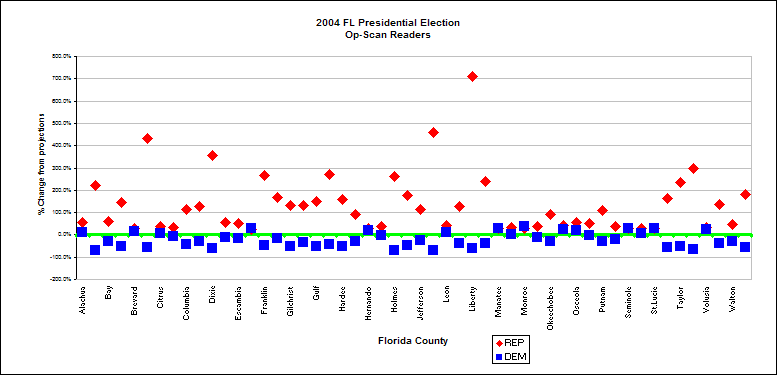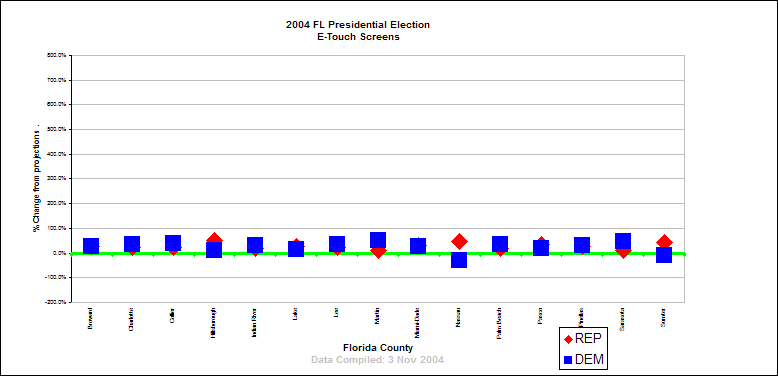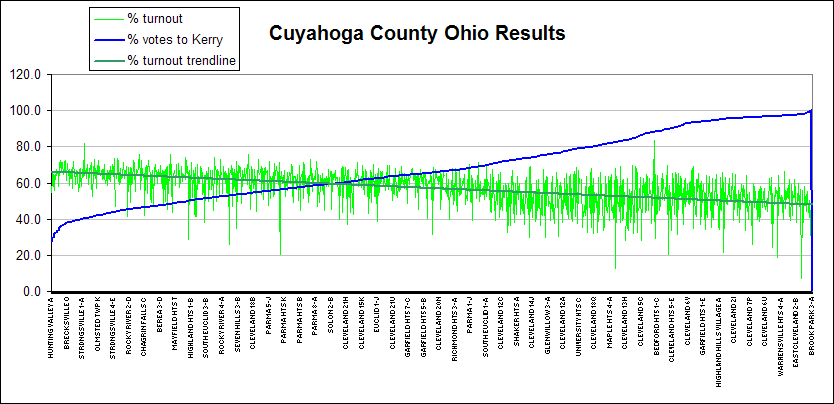
|
Voting Fraud in the 2004 Presidential Election The exit polls The exit polls were dismissed as being innaccurate. But their accuracy may have depended on the type of voting machine that was used, implying that the machines, not the polls, were inaccurate. (Disclaimer: States did not use exclusively one type of machine. This chart is a starting point for investigation, not a conclusion. Chart source) FLORIDA The counties that used optical scanner machines to record votes showed a consistent pattern of far more votes for Bush and far less votes for Kerry than projected, based on the number of registered republicans and democrats. (Data for this and the next chart from http://ustogether.org/Florida_Election.htm.) (click to enlarge) The counties in Florida that used touchscreen voting had a relatively normal distribution of final votes for Bush and Kerry compared to the amount of registered democrats and republicans and the projected turnout. (click to enlarge)
Compare just the counties that had from 80,000-500,000 voters. Early Thursday,
as Broward County elections officials wrapped up after a long day of
canvassing votes, something unusual caught their eye. Tallies should
go up as more votes are counted. That's simple math. But in some races,
the numbers had gone . . . down. Collier County Duval County Glades County Highlands County Lake County Miami Dade County Okaloosa County Orange County Osceola County Leon County Palm Beach County Volusia County Election equipment counted straight-party votes for Democratic candidates as Libertarian votes, an error that could affect election outcomes in as many as nine counties. Note: Incumbant Congressman Baron Hill (D) was narrowly defeated in this election. Media refers to error as a glitch. Error favors republicans. The day after a two-and-a-half-hour delay in counting ballots due to a glitch in a computer program, LaPorte County election officials are still trying to figure out what happened. "Maybe there was a power surge," LaPorte County Clerk Lynne Spevak said. "Something zapped it." At about 7 p.m. Tuesday, it was noticed that the first two or three printouts from individual precinct reports all listed an identical number of voters. Each precinct was listed as having 300 registered voters. That means the total number of voters for the county would be 22,200, although there are actually more than 79,000 registered voters. Media refers to error as a glitch. Laport County is democratic, error appears to favor republicans. Questions started arising Wednesday when Republicans pointed out a significant discrepancy in the original unofficial results: more early votes than early voters. Elections officials immediately moved to audit the early vote totals and released new numbers Thursday. In response to Observer questions Friday, Dickerson said some vote totals were typed in by hand election night rather than electronically downloaded because of a computer glitch. ...Dickerson said he believes the county's voting machines functioned properly. ...The audited vote totals issued Thursday derailed a Democratic sweep of the three at-large county commissioner seats -- for now, at least. It left the second, third and fourth vote-getters within fewer than 100 votes of each other. Error is referred to as a glitch. NEBRASKA "As many
as 10,000 extra votes," according to this report, "have been
tallied and candidates are still waiting for corrected totals. Johnny
Boykin lost his bid to be on the Papillion City Council. The difference
between victory and defeat in the race was 127 votes. Boykin says, 'When
I went in to work the next day and saw that 3,342 people had shown up
to vote in our ward, I thought something's not right.' He's right. There
are not even 3,000 people registered to vote in his ward. For some reason,
some votes were counted twice." New Mexico State
Police are investigating allegations of voter fraud – including
one instance in which an as-of-yet unnamed woman is being connected
with up to 200 bogus ballots. “One of my employees can identify
one person that did bring in the majority of those cards that we didn’t
enter into our rolls because addresses didn’t exist,” said
Bernalillo County Clerk Mary Herrera, explaining why her office disqualified
several provisional ballots. Provisional ballots are ballots that voters
are allowed to cast if the voter’s name isn’t on the voter
roll at their polling place. Before they are counted, the county clerk
verifies that the voter is actually registered. Herrera says roughly
25 percent of the provisional ballots in Bernalillo County have been
rejected as invalid. Now that those in-lieu-of ballots have been sorted,
the vote counting begins. The unofficial
vote total, with 99 percent of the precincts reporting, gave State Senate
Candidate Spano (R) a lead of 1,674 votes. He had 54,120 votes, or 51
percent, to Stewart-Cousins' (D) 52,446 votes, or 49 percent. After
the first hours of a two-week vote recount, Democrats claimed Monday
that their candidate for the state Senate from Yonkers had wiped out
almost all of her unofficial deficit and moved within 288 votes of the
powerful Republican incumbent, Nicholas Spano. The county Board of Elections
disclosed Friday that seals on 22 machines were damaged or missing.
Jonathan Rosen, director of the state Democrats' campaign committee,
said Democrats' election lawyer Berger told him that nearly every machine
had a higher count for Stewart-Cousins than was recorded. However, Spano
also gained votes, including 80 from one machine, Rosen said. More than 4,000
early votes were lost because the electronic voting system could not
store the volume of votes it received. The county was told by the manufacturer
of the voting system that its units could store up to 10,500 votes,
but the limit was actually 3,005 votes. Elections board officials were busy tallying corrections Wednesday to results in Guilford, Yadkin and Chowan counties, Bartlett said. A systems software glitch in Craven County's electronic voting equipment is being blamed for a vote miscount that, when corrected, changed the outcome of at least one race in Tuesday's election. Then, in the
rush to make right the miscalculation that swelled the number of votes
for president here by 11,283 more votes than the total number cast,
a human mistake further delayed accurate totals for the 40,534 who voted. Cuyahoga County has an inverse relationship between voter turnout and support for Kerry. Raw data compiled by Joe Knapp.
In Parma, precint 6450 the turnout was 94%. 40% of the voters left the presidential candidate blank, according to county records. Beachwood had 9943 registered voters, who cast 13939 ballots, for a 140.189078 % overvote Bedford had 9942 registered voters who cast 14465 ballots, for a 145.493864% overvote Bedford Heights 8142 who cast 13512 ballots, for a 165.954311% overvote http://boe.cuyahogacounty.us/BOE/results/currentresults1.htm Kerry received 78 less votes than Al Gore in 2000, but Bush received 3000 more votes. Drake is the only county in Miami Valley where Kerry’s votes was less than Gore’s and where Bush’s vote rose dramatically. Franklin County's unofficial results had Bush receiving 4,258 votes to Democrat John Kerry's 260 votes in a precinct in Gahanna. Records show only 638 voters cast ballots in that precinct. An electronic voting machine added 3,893 votes to President Bush's tally in a suburban Columbus precinct, even though there are just 800 voters there. Error is referred to as a glitch. Error favored republican. In Franklin County, where Franklin County Board of Elections Director Matt Damschroder is also the former Executive Director of the county’s Republican Party, the county Board of Elections building looked like a bunker. Scores of city buses blocked parking spaces on the street outside, numerous concrete barricades surrounded the parking lot, and a metal detector was stationed at the only entrance. A phalanx of armed deputy sheriffs swarmed the only site where provisional voters could cast a guaranteed ballot. The Columbus Dispatch confirmed an Election Day Free Press story that far fewer voting machines were present in predominantly black Democratic inner-city voting wards than in the recent primary election and the 2000 presidential election, with their lighter turnouts. The reduced number of machines caused voters to wait up to seven hours and wait an average of approximately three hours. One Republican Central Committee member told the Free Press that Damschroder held back as many as 2000 machines and dispersed many of the other machines to affluent suburbs in Franklin County. Source. Franklin County's absentee ballot forms are designed in ways strikingly reminiscent of those notorious butterfly ballots in the Florida 2000 presidential election. On Franklin County absentee ballot forms, Kerry is the third name on the list of presidential candidates on the left side of the ballot. But, the punch card is designed to fit in the middle, so the actual number you punch for Kerry is hole "4." If you mistakenly punch hole "3" you've just voted for Bush. With 100% of the precincts reporting at 9am EST Wednesday, Nov. 3, Bush had 20,807 votes (65.80%) and Kerry had 10,724 (33.92%). Miami reported 31,620 voters. Inexplicably, nearly 19,000 new ballots were added after all precincts reported, boosting Bush’s vote to 33,039 (65.77%) to Kerry’s 17,039 (33.92%). CASE is investigating why the percentage of the vote stayed exactly the same to three one-hundredths of a percentage point after nearly 19,000 new ballots were added. CASE members speculate that it’s either a long-shot coincidence with the last three digits remaining the same, or that someone had pre-set a database and programmed a voting machine to cough up a pre-set percentage of votes. Miami County uses an easily hackable optical scanner with the central counter provided by the Republican-linked vendor ES&S. Citing concerns about potential terrorism, Warren County officials locked down the county administration building on election night and blocked anyone from observing the vote count as the nation awaited Ohio's returns. County officials say they took the action Tuesday night for homeland security, although state elections officials said they didn't know of any other Ohio county that closed off its elections board. Media organizations protested, saying it violated the law and the public's rights. The Warren results, delayed for hours because of long lines that extended voting past the scheduled close of polls, were part of the last tallies that helped clinch President Bush's re-election. Bush actually received 365 votes in the precinct, Matthew Damschroder, director of the Franklin County Board of Elections, told The Columbus Dispatch. Now, they say an FBI agent told them that Warren County ranked a "10" on a terrorism scale. However, state and federal homeland security officials said Tuesday they were unaware of any specific threat against the county. County officials locked down the administration building on Justice Drive after the polls there had closed. "It wasn't international terrorism that we were in fear of; it was more domestic terrorism," South said Tuesday. County board of elections officials had compiled a list of people who were approved for after-hours access, but that list didn't include reporters. It also didn't include an approved ballot-count watcher. "I was denied admission myself," said Jeff Ruppert, the Warren County counsel for the Kerry-Edwards campaign. "I had to present credentials." One precinct
recorded a negative 25 million votes. Lark charged that a number of voters may have been disenfranchised by the problems that shut down voting machines for all or most of the day. Some precincts didn't have enough paper ballots for people to fill out, and Lark said he suspects some people didn't bother coming back when a new supply of paper ballots arrived. He had no estimate on how many people may have missed a chance to vote, but he did have some questions Friday about the accuracy of the count coming out of the electronic machines that were working. Lark cited statistics
collected by a poll worker at the Farrell municipal building poll, which
showed the voting machine recorded that 289 people cast ballots. The
machine, however, recorded a total of 48 votes for U.S. Sen. John Kerry
and three votes for George W. Bush in the presidential race. Lark said
he finds it difficult to believe that only 51 people out of the 289
who voted actually cast a ballot in the presidential race. Six years later Hagel ran again against Democrat Charlie Matulka in 2002, and won in a landslide. He was re-elected to his second term with 83% of the vote: the biggest political victory in the history of Nebraska. Again, the votes were counted by ES&S, now the largest voting machine company in America. While these victories
could be dismissed simply as a Republican upset, a January 2003 article
in the independent Washington paper The Hill revealed interesting details
about Hagel's business investments and casts a different light on his
election successes. Chuck Hagel was CEO of ES&S (then AIS) until
1995 and he is still a major stockholder of the parent company of ES&S,
McCarthy & Company. In Florida, ground zero for election problems, ES&S retained the services of a former secretary of state and one-time running mate of Governor Jeb Bush. In 2001, Global Election Systems (Diebold's predecessor) hired the former chair of Florida's Republican Party, the former running mate of a previous governor, and a former environmental advisor to Jeb Bush, according to the Miami Herald. The lobbyist trying to win the $24.5 million Miami-Dade contract for ES&S was a top GOP lawyer who worked against the recount in 2000. The Votomatic punch-card machines at the center of the 2000 Florida election debacle were, ironically enough, also manufactured by ES&S. Diebold:
Populex: |


